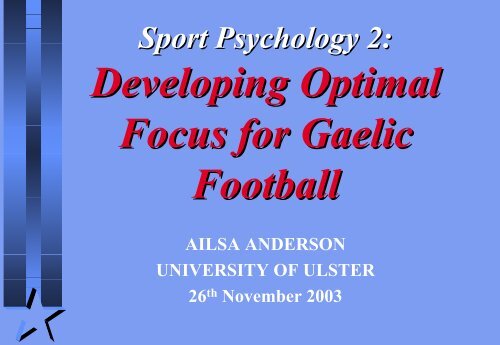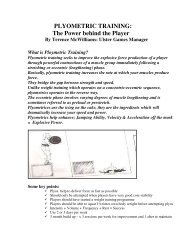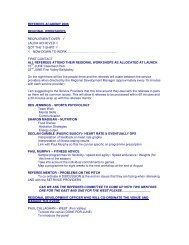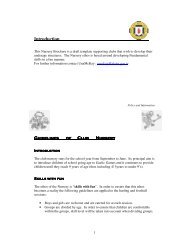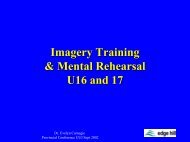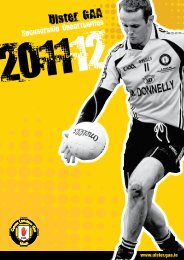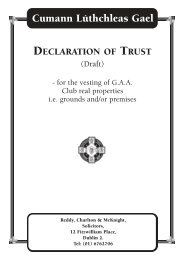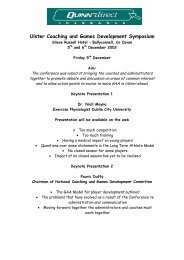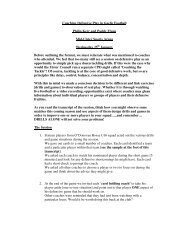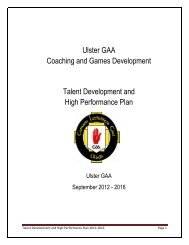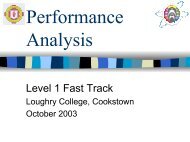Developing Optimal Focus for Gaelic Football - Ulster GAA
Developing Optimal Focus for Gaelic Football - Ulster GAA
Developing Optimal Focus for Gaelic Football - Ulster GAA
You also want an ePaper? Increase the reach of your titles
YUMPU automatically turns print PDFs into web optimized ePapers that Google loves.
Sport Psychology 2:<br />
<strong>Developing</strong> <strong>Optimal</strong><br />
<strong>Focus</strong> <strong>for</strong> <strong>Gaelic</strong><br />
<strong>Football</strong><br />
AILSA ANDERSON<br />
UNIVERSITY OF ULSTER<br />
26 th November 2003
Coaches’ comments<br />
FOCUS!<br />
KEEP<br />
CONCENTRATING!<br />
JUST LET IT GO!<br />
DON’T GET<br />
DISTRACTED!<br />
HIS HEAD JUST WASN’T<br />
HERE TODAY!
MENTAL CIRCUIT TRAINING<br />
FOR PEAK PERFORMANCE<br />
STATION 1<br />
MOTIVATION<br />
STATION 8<br />
STATION 2<br />
ANXIETY<br />
CONTROL<br />
KEEPING<br />
CONTROL<br />
STATION 3<br />
COMMUNICN<br />
STATION 7<br />
COPING WITH<br />
PROBLEMS<br />
STATION 4<br />
CONCENT N<br />
STATION 6<br />
STATION 5<br />
MENTAL<br />
PREPARATION<br />
SELF-<br />
CONFIDENCE
Top players develop optimal<br />
focus <strong>for</strong><br />
training<br />
matches<br />
the season
AIMS OF WORKSHOP<br />
To provide an introduction<br />
to some theory behind<br />
focusing<br />
Identify practical strategies<br />
to develop optimal<br />
focusing
DEFINITIONS????????<br />
Attention<br />
Concentration<br />
<strong>Focus</strong><br />
“ the term ‘attention’ is one of the most<br />
notoriously vague theoretical constructs<br />
in psychology”<br />
(Eysenck 1988 – p.9)
ATTENTION<br />
-mental ef<strong>for</strong>t!<br />
1) Ability to<br />
‘concentrate’<br />
(generally)<br />
2) Ability to<br />
‘zoom in’/<br />
focus on<br />
specific task<br />
relevant info<br />
3) Ability to<br />
‘divide’<br />
attention to<br />
per<strong>for</strong>m more<br />
than one skill<br />
at once
2) Ability to ‘zoom in’<br />
Attention is like a ‘spotlight’<br />
If not concentrating then can’t<br />
process the in<strong>for</strong>mation and act<br />
Spotlight can be broad or<br />
narrow<br />
Need to focus on right<br />
things at the right time!
3) Ability to divide attention<br />
Can we effectively pay attention to more than<br />
one thing at once?<br />
Concentration grid<br />
‘Attention’ is a limited resource<br />
Need to minimise/ deal with<br />
distractions
Sometimes we can pay<br />
attention to more than 1 thing<br />
If one of the skills is<br />
highly practiced<br />
If the skills use<br />
different senses
LIMITED<br />
SPACE
“It was 3 all in the first set, and I had<br />
break points in every game. It should<br />
have been 4-2 at the least. I wasn’t<br />
focused, my mind was all over the<br />
place…All those thoughts are going<br />
through my mind. The problem is they<br />
are going through my mind on the court”<br />
Martina Navratilova after defeat by Helena<br />
Sukova at US Open in 1993
TAKE<br />
CONTROL OF<br />
THE LIMITED<br />
SPACE
Remember:<br />
Need to focus on right things at<br />
the right time!<br />
Need to minimise/ deal with<br />
distractions
Need to focus on the right thing<br />
at the right time!<br />
3 STEPS:<br />
1) Know WHAT to focus on<br />
2) Know WHAT NOT to focus on (so<br />
can catch self)<br />
3) Have STRATEGIES to help keep<br />
focused on right thing at right time and<br />
deal with distractions
It’s not about losing<br />
concentration it is<br />
about misplacing it!
Group work<br />
Scenarios
Distractions<br />
Internal<br />
EG<br />
Negative thoughts<br />
Shaky<br />
External<br />
EG<br />
Crowd<br />
Score<br />
Team-mates
Control the<br />
controllables!
Cope with the<br />
uncontrollables!
Strategy 1 - Know what should be<br />
focused on<br />
Are players/ coaches aware of what they<br />
should be focused on?<br />
Use scenarios like we did (what ifs?)<br />
Positive coaching<br />
Don’t think about a pink elephant<br />
‘don’t miss’ Vs ‘strong technique’
Strategy 2 – COPE EFFECTIVELY<br />
WITH DISTRACTIONS<br />
‘COPE WITH THE<br />
UNCONTROLLABLES’<br />
Ignore and Refocus<br />
Take control of the content of the limited<br />
space in your head
Strategy 2 – FOCUSING CUES<br />
Reminders to ‘switch on’ or ‘refocus’<br />
1) VERBAL<br />
‘focus’/ ‘ready’/ ‘smooth’<br />
2) VISUAL<br />
Staring at writing on the ball<br />
3) PHYSICAL<br />
Wiping hand on shirt/ take a deep breath
Strategy 3 - ROUTINES<br />
Pre-match/ Pre-kick/ Pre-training<br />
ADVANTAGES:<br />
–1) Help block out irrelevant distractions and focus on<br />
task relevant in<strong>for</strong>mation<br />
– 2) Provide a sense of familiarity - just another kick<br />
– 3) Maximize the likelihood of a consistent<br />
per<strong>for</strong>mance<br />
Bull et al. (1996)
Pre-kick<br />
<br />
"When<br />
everything is<br />
going crazy<br />
around you and<br />
the nerves are<br />
attacking your<br />
confidence, it's<br />
important to<br />
keep everything<br />
exactly the<br />
same,“<br />
<br />
(from<br />
www.bbc.co.uk)
33/41 successful kicks<br />
<br />
<br />
<br />
<br />
Place the ball on the kicking tee. Take four<br />
steps back, five to the side.<br />
Create a right angle between the ball, your<br />
body and the posts.<br />
Take one more step towards, look at the<br />
posts and pick an exact spot at which to<br />
aim, drawing an imaginary line from that<br />
point down to the ball.<br />
Then a deep breath, one more check of the<br />
line, a purposeful stride <strong>for</strong>ward, a plant of<br />
the right foot, let the left swing through the<br />
ball and - bang.
<strong>Developing</strong> routines<br />
May include:<br />
Imagery<br />
<strong>Focus</strong>ing cues (words/ actions)<br />
Positive affirmations (Let’s do it)<br />
Relaxation – deep breath<br />
In pairs – choose a skill and consider<br />
what sort of routine could be appropriate
Pre-match routines<br />
Do whatever it takes to be ready <strong>for</strong> the<br />
match<br />
REALLY ready!<br />
EG – no alcohol/ night be<strong>for</strong>e meal/<br />
making time <strong>for</strong> imagery/ early to bed etc
Avoid superstitious rituals<br />
Superstitions are based on<br />
assumption that factors out<br />
with one’s control<br />
influence behaviour<br />
<strong>Focus</strong> on factors that can<br />
control!
Strategy 4 - GOAL SETTING<br />
Setting goals focuses the mind and increases<br />
the likelihood of QUALITY per<strong>for</strong>mance<br />
Goals should focus on factors can control<br />
(per<strong>for</strong>mance/ technique/ ef<strong>for</strong>t – NOT the<br />
result)<br />
Goals <strong>for</strong>:<br />
– Season<br />
– Match<br />
– Training
Training goals<br />
‘It’s not about practice makes<br />
perfect… it is perfect practice that<br />
makes perfect’<br />
Train like you are going to compete!<br />
Set training goals – why are you here and what<br />
are you going to do?
Summary<br />
Provide introduction to theory behind<br />
optimal focusing <strong>for</strong> sport<br />
Practical strategies to help focus on what<br />
is important and deal with distractions
Game Over!


